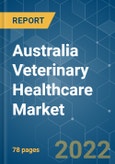The Australia veterinary healthcare industry has been impacted by the effect of coronavirus, especially on the livestock segment. An unprecedented rise in pet ownership across the country has seen post-COVID-19. There has been an increasing focus on veterinary telemedicine in the country, which is likely to have a positive impact on the market. In April 2020, the Australian Veterinary Association Ltd (AVA) Board ratified the AVA telemedicine policy and initiated extensive tele-veterinary services in the country. This will lead to increased veterinary teleconsultations and telepharmacy during the pandemic, thereby lead to increased adoption of tele veterinary services, driving the market growth.
The Australia veterinary healthcare market is projected to lead by advancements in health technology, leading to innovations in animal healthcare and increasing animal adoption in Australia, coupled with animal health spending. According to the Animal Medicine Australia 2021 Survey published in October 2021, Australian households own an estimated total of 6.3 million dogs and 4.9 million cats in the country. The high adoption of pets in Australian households will lead to increased adoption of veterinary healthcare services in Australia, thereby driving the market growth.
Furthermore, rise in collaborations between key market players and investments in veterinary health is also expected to drive the growth of this market. For instance, in November 2021, Merck Sharp & Dohme Corp (MSD) Animal Health, a division of Merck & Co., Inc., has joined VetDB as an investor. In VetDB's third round of seed funding, MSD Animal Health joins the company's previous investors. VetDB's continuous growth and nationwide dissemination of its revolutionary medical technology will be aided by this financing. The rising investments by companies for the development of veterinary health technology is therefore expected to contribute the market growth over the forecast period.
Therefore, the rising adoption of pets, rise in investments for technological advancements of veterinary health, among other are expected to drive the growth of this market. However, there is a shift in the trend toward the use of counterfeit medicines for animal health, which are usually cheap, of low quality, and produced without adequate testing. These act as restraints for the market's growth.
Key Market Trends
Vaccines Segment Holds a Major Share in the Market
Vaccines segment holds a major share in the Australia veterinary healthcare market. The veterinary vaccines segment in Australia is expected to be driven by innovations in vaccines, rising vaccine launches, growing awareness of animal health, increasing investments by government bodies and associations, increased demand for animal protein, including milk, meat, eggs, and fish, and increased expenditure on the healthcare of companion animals.
According to news published in January 2022, Australian veterinarians are encouraging government agencies to vaccinate the country's pets against a global pandemic using a Russian-developed animal vaccine. Dr. Sam Kovac of Southern Cross Vets in Sydney is yet to receive clearance from the Australian Pesticides and Veterinary Medicines Authority for the vaccination of Pets in Australia. The rise in such initiatives will drive the growth of vaccines segment in this market.
Furthermore, in April 2020, the University of Adelaide, an Australian university, was awarded an AUD 390,000 (USD 252,000) Linkage Grant by the Australian Research Council to improve the effectiveness of a Salmonella Typhimurium vaccine in poultry. Such steady developments help boost this market segment and the overall market over the forecast period.
In addition, in December 2021, Australian life science company, QBiotics, launched STELFONTA its lead veterinary pharmaceutical in Australia, that is approved by the Australian Pesticides and Veterinary Medicines Authority (APVMA) for the treatment of canine non-metastatic mast cell tumours (MCT)
Therefore, owing to the above factors, the vaccine segment is expected to drive in the Australia veterinay healthcare market during the forecast period.
Competitive Landscape
The Australia veterinary healthcare market is majorly dominated by a few players. However, there are a few companies that are currently penetrating the market and are expected to hold substantial market shares. The market is expected to drive swiftly due to factors such as rise in product launches, increased in pet care, rise in technological advancements in pet care, among othersThe major players are Zoetis Animal Healthcare, Merck Animal Health, Ceva Animal Health Inc., Virbac Corporation, among others.
Additional Benefits:
- The market estimate (ME) sheet in Excel format
- 3 months of analyst support
This product will be delivered within 2 business days.
Table of Contents
Companies Mentioned (Partial List)
A selection of companies mentioned in this report includes, but is not limited to:
- Boehringer Ingelheim
- Elanco
- Merck Co. Inc.
- Vetoquinol SA
- Virbac
- Zoetis Inc.
- Chemvet Australia Pty Ltd
- Jurox Pty Ltd
- Idexx Laboratories
- Abbey Animal Health Pty Ltd
- QBiotics Group Limited
- Ceva Animal Health Pty Ltd
- Luoda Pharma Pty Ltd
- Sypharma Pty Ltd










